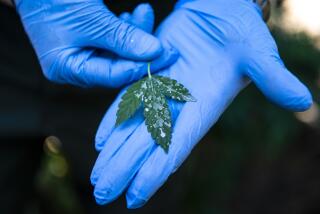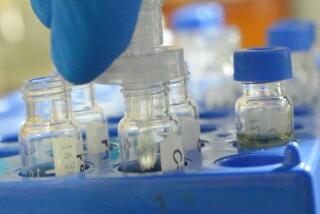To Test or Not to Test: That Is the Question
That modern American rite, the drug test, is about to invade the home, courtesy of a company whose mail-order kits--suggested retail: $40--will enable parents to collect and get readings of urine samples taken from their own teenagers.
The unanswered question is: What mayhem will follow?
“I can see heated moral debates and child-rearing debates,” said Carl Moore, 55, a Manhattan Beach parent who thinks the whole idea smacks of dark science fiction--maybe an outtake from the George Lucas film “THX 1138,” with cynical adults watching their offspring from behind two-way mirrors.
“If you could implant probes in your kid’s head,” Moore wondered, “to know what he’s doing and where he is all the time, would you really do that?”
Nix on the test kit for Moore, but the rise in teenage drug abuse apparently has fostered a market for Dr. Brown’s Home Drug Testing System, as the device is called. Its approval on Tuesday by the Food and Drug Administration--after months of controversy about home-testing issues--now puts parents in an anguishing position: Buy it? Or not buy it? Opt for trust and domestic peace? Or risk finding out and trying to make a change?
Carolee Bogue has chosen the latter route.
“I’m a detective. I look for information,” said the mother of five who began testing her children at home in 1985, long before the FDA gave its nod of approval to any such kit. She said she feels good about it because she knows she is doing what she can to help them.
“I try to piece together the puzzle of what’s really going on in my kids’ lives,” Bogue said. “I remember when I did the first test, more than 10 years ago, my daughter said, ‘Jeez, Mom, don’t you trust me?’ and I said ‘I trust you. I love you. But I’m trying to be an A-1 mother.’ ”
But even Bogue, who serves as a dean of students and a drug program administrator at Fairfax High School, sees a darker side to it--a side that resonates of George Orwell and “1984.” Like everyone else, she wonders just how this will shake out.
If some American teenagers see home as a hell or jail, having Mom standing by the door with a request for a urine sample isn’t going to help the situation.
“Drug testing is real important, but it’s got to be done for the right reasons,” said Bogue, 54. “It can’t be held over the kid’s head as an ‘I gotcha!’ thing. That’s going to drive the stake into the parent-child relationship even further.”
Some parents admitted they were open-minded about giving such tests, but with reservations.
Betty, a Glendale resident who preferred not to give her full name, said she would use the testing kit but would want to discuss it first with each of her two sons, 13 and 15.
“I would tell him that I trusted him but that I wanted to make sure,” she said. Pausing for a moment, she added: “But that’s a hard question. I would like to give them the benefit of the doubt.”
Some students--no surprise--were strongly opposed to the notion of urinating in a paper cup so that their parents could see if they were using marijuana, cocaine or methamphetamines. The kit--marketed by Personal Health and Hygiene Inc. of Silver Spring, Md.--tests for six drugs, including morphine, codeine and heroin.
*
The demand for an at-home test for drugs has arisen in large part from recent national surveys showing that illicit drug use among children and teens has risen steadily since 1991.
The most recent survey, funded by the National Institute on Drug Abuse, showed that marijuana use, in particular, has soared. The number of eighth-graders who said they had used marijuana in the past year rose from 6% in 1991 to 18% in 1996, and nearly one in 20 of all high school seniors said they used marijuana daily.
More children and teens are also using LSD, cocaine and methamphetamine.
Not only are young people becoming more willing to experiment with drugs, but at the same time, surveys show, parents simply don’t know what their kids are doing and they feel uncomfortable talking to them about drug use, said George Marcelle, an information specialist with the Center for Substance Abuse Prevention in Los Angeles.
Marcelle cited recent a Carnegie Corp. report that showed that children 9 to 14 are often left unsupervised.
“One of the things that report emphasized is the time this age group spends alone and unsupervised and the diminished time parents have to spend with kids in this critical time in their lives,” Marcelle said. “I think that creates a market for alternative tools or products to take the place of that direct parental involvement.”
*
Sunny Cloud, the catalyst for the home drug testing issue, said Wednesday that she was happy that the FDA had approved a home test, even though it’s not her own Parents Alert.
“The FDA has done a 180,” she said. “It’s a blessing and a victory for American parents.”
Cloud, 47, said she will continue marketing her test kit as she has been doing for nearly two years.
Cloud, a single mom, caught her son smoking marijuana in her suburban Atlanta home more than two years ago. She said she freaked, taking him to an area emergency room and having him tested for drugs. She found the experience humiliating as the nurse called out her son’s name in a crowded emergency room: “It’s time for your drug test.”
So she decided to develop and market a home drug test that parents could use on children.
The FDA found out about it and sent her a letter warning that the kit was not approved for home use. The Republicans found out about the FDA’s warning and used the issue in an election year to show that the Clinton administration was soft on drugs. The Clinton administration introduced the issue to the country as one of classic red tape--one it would soon remedy.
After the election, Cloud received a letter from the FDA withdrawing its warning.
*
So, what is the best way to test a child for drug use?
Linda Wagener, a Pasadena clinical psychologist who specializes in child and adolescent issues, said:
“I would use the test kits for anyone up to 18 who is living in his or her parents’ home and whose parents have reason to be suspicious. It works best if a parent is honest, said he cannot trust his child’s word anymore, and until that trust can be rebuilt, we are going to use drug testing.
“If a parent has already lost control,” she said, “the teen may only respond to random testing if there is a very positive reward for coming up clean and drug-free. The reward, in severe cases, might be that the teen will be allowed to continue living at home, as opposed to being shipped out. In less severe cases, the curfew might be extended as long as the teen tests free of drugs.”
Michael McGee, 50, a private investigator, was far more cynical about the test accomplishing anything. He and his wife, Barbara, 42, have a 13-year-old daughter and a 16-year-old son.
Teenagers today, McGee said, just don’t put up with being tested at home.
“They tell you to go to hell if you approach them with it,” he said.
* Times staff writers John Glionna, Andrew Blankstein, Bettijane Levine, D. James Romero, Angie Chuang and Solomon Moore contributed to this story.
More to Read
Sign up for Essential California
The most important California stories and recommendations in your inbox every morning.
You may occasionally receive promotional content from the Los Angeles Times.










